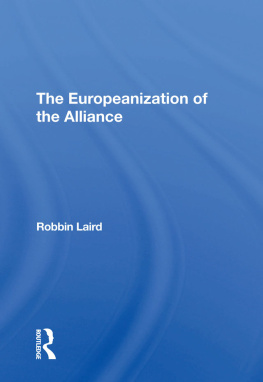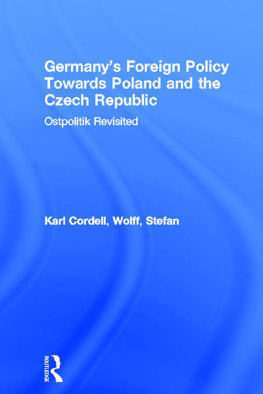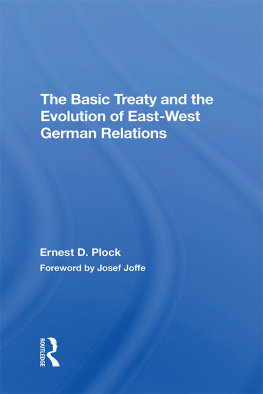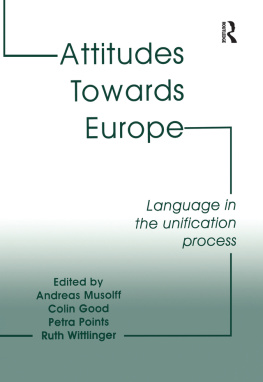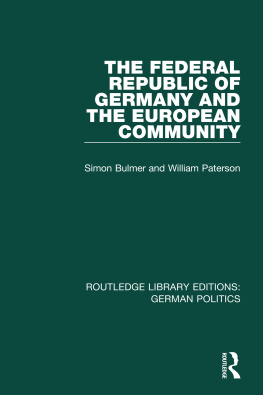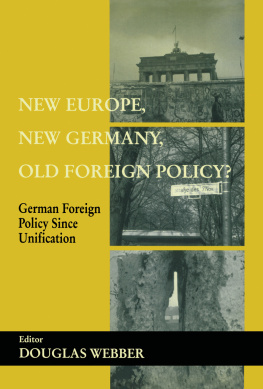The Soviets, Germany, and the New Europe
The Soviets, Germany, and the New Europe
Robbin F. Laird
First published 1991 by Westview Press, Inc.
Published 2019 by Routledge
52 Vanderbilt Avenue, New York, NY 10017
2 Park Square, Milton Park, Abingdon, Oxon OX14 4RN
Routledge is an imprint of the Taylor & Francis Group, an informa business
Copyright 1991 Taylor & Francis
All rights reserved. No part of this book may be reprinted or reproduced or utilised in any form or by any electronic, mechanical, or other means, now known or hereafter invented, including photocopying and recording, or in any information storage or retrieval system, without permission in writing from the publishers.
Notice:
Product or corporate names may be trademarks or registered trademarks, and are used only for identification and explanation without intent to infringe.
Library of Congress Cataloging-in-Publication Data
Laird, Robbin F. (Robbin Frederick), 1946
The Soviets, Germany, and the New Europe / Robbin F.
Laird.
p. cm.
ISBN 0-8133-8048-0
1. Soviet UnionForeign relationsGermany. 2. GermanyForeign
relationsSoviet Union. 3. Soviet UnionForeign relations1985
4. Soviet UnionForeign relationsEurope. 5. EuropeForeign relationsSoviet Union. I. Title.
DK67.5.G3L25 1991
327.47043dc20 91-24783
CIP
ISBN 13: 978-0-367-29620-9 (hbk)
To my brother and sister Harriet and Bruce Laird, who have had a much better relationship than the Soviets and the Germans
This book has taken several years to complete, and my intellectual debts are considerable. I would like to thank Susan Clark for her contribution throughout and especially for providing the material for the monthly summaries. Armin Leon of the University of Bonn has provided me with travel and conceptual support in Germany for a number of years and was especially helpful in assessing Soviet public diplomacy in West Germany. Daniel Peris of the University of Illinois worked with me as a research assistant for a number of years and was a major force in shaping the chapter on the Soviet assessments of the West European security cooperation process. Theo Gemelas provided help throughout, especially with the index.
The United States Institute of Peace provided a grant that allowed the book to be written. The American Institute for Contemporary German Studies provided a congenial environment where the manuscript was brought to completion. Thanks go to my friends on the staff, Gerry Livingston, Jack Janes, and Lynn van Norstrand.
Finally, I would like to thank my intellectual kollektiv over the years--Ken Maxwell, Erik Hoffmann, Chris Jones, Fred Fleron, Blair Ruble, Heinrich Vogel, Marie Mendras, Murielle Delaporte, Marc Perrin de Brichambaut, Phil Williams, Ron Asmus, Bob Nurick, Dale Herspring, and Harry Klein.
Special thanks should go to my colleagues who have analyzed Soviet-German issues over the years, notably Hannes Adomeit. Michael Sodaro, and Angela Stent. My work should be seen as contemporary supplement to their historical assessments of the Soviet-German dynamic.
Robbin F. Laird
This book assesses the evolution of the Soviet approach toward European security policy since the mid-1980s, as seen from the prism of assessments of and policy toward the Federal Republic of Germany. The first part of the book addresses the general context within which the Soviets have framed their policy toward the Federal Republic of Germany, while the remaining parts focus specifically upon Soviet assessments of the Federal Republic from 1985-1990. The book concludes with a prospective on the Soviet approach toward the new Federal Republic of Germany as a component of the domestic debate about how to deal with the new Europe.
The Soviets and European Security Policy: The General Context
The first part of the book analyzes the general context within which the Soviets have addressed the question of how to deal with the Federal Republic of Germany. Each chapter in this part deals with an aspect of the general Soviet approach. The first chapter addresses the evolution of Soviet foreign policy and the role of the West in that evolution. The second chapter identifies the classic Soviet anti-coalition strategy toward the West. And the third chapter outlines in detail how Soviet analysts approached the problem ofEuropeanization or European construction in the Gorbachev period. Increasingly, the problem of Europeanization came to overshadow the classic Soviet foreign policy paradigm and anti-coalition approach. The German problem would emerge as an important manifestation of the Europeanization challenge.
The Soviets and the West in Historical Perspective
and a cluster of ten key elements making up the Soviet foreign policy paradigm is defined.
In the classic approach of Soviet policy, Soviet leaders tried to balance carefully competitiveness and cooperation with the West. The West provided a model of progress in the economic sphere, but not in the cultural, political and military spheres. The Soviets strove to keep the West at bay as they developed their own unique model of historical progress.
The Soviet foreign policy paradigm and the classic Soviet approach toward the West are under challenge today. Gradually, the belief in a unique Soviet socialist model gave way to a search for a new model. The West remains an important challenge to the Soviets as they seek to find a new developmental model, but how to relate Soviet foreign to domestic policy in the new global setting is not at all clear. Even though interaction with the outside world has been vastly expanded in the Gorbachev period, the power instruments available to the Soviet elites to develop their own country remain unidimensional, Military power remains important. But how will the Soviet elites develop the economic power to participate in their own reconstruction within a global economic setting? How will the Soviets develop a culture compatible with twenty-first century modernization?
The Soviets are an increasingly significant negative factor overhanging European development. The Soviet Union no longer threatens the West by means of a cohesive national elite with awesome military might at its disposal and with the intention of crushing Western growth and development. Instead, it represents a challenge primarily in terms of whether it can overcome its past and join the modernization process. If the Soviets fail to find a peaceful transition to the future, the weight of the past will challenge the West once again. The dreams of building a new Europe and a new world order will be dashed by the inability of the Russians to leave their autocratic and autarchic past.
The classic Soviet approach toward the West rested upon a process of controlled interaction. Military power was the means whereby the Soviet Union protected itself from Western contamination and untoward influence. In dealing with the Western Alliance, the Soviet leadership developed an anti-coalition strategy to contain the West and its negative influences.
The Anti-Coalition Strategy Toward the Western Alliance
outlines the main characteristics of the anti-coalition strategy, Soviet analysts were well aware of the voluntary quality of membership in the Western alliance as well as the increased national assertiveness among alliance members. They also recognized the collective strength of the alliance when cohesion prevails. Hence, the maximization of Soviet power required the reduction of alliance cohesion and the pursuit of an anti-coalition strategy to drive wedges and expand fissures within the alliance




